Daibutsu
Daibutsu (大仏, kyūjitai: 大佛) or 'giant Buddha' is the Japanese term, often used informally, for large statues of Buddha. The oldest is that at Asuka-dera (609) and the best-known is that at Tōdai-ji in Nara (752).[1] Tōdai-ji's daibutsu is a part of the UNESCO World Heritage Site Historic Monuments of Ancient Nara and National Treasure.
Examples
| Image | Name | Buddha | Size | Date | Municipality | Prefecture | Comments |
|---|---|---|---|---|---|---|---|
| Shōwa Daibutsu (昭和大仏)[2] | 21.35 metres (70.0 ft) | 1984 | Aomori | Aomori Prefecture | |||
| Ganmen Daibutsu (岩面大仏) | 16.5 metres (54.1 ft) | Hiraizumi | Iwate Prefecture | Low relief carving at Takkoku no Iwaya (達谷窟) | |||
 | Ushiku Daibutsu (牛久大仏)[3] | Amida Nyorai | 120 metres (393.7 ft) including base and lotus (20 metres (65.6 ft)) | 1993 | Ushiku | Ibaraki Prefecture | Japan's largest daibutsu |
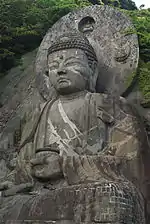 | Nihon-ji Daibutsu (日本寺大仏)[4] | Yakushi Nyorai | 31.05 metres (101.9 ft) | 1790 | Kyonan | Chiba Prefecture | Carved in the 1780s and 90s by Jingoro Eirei Ono and his apprentices and restored to its present form in 1969. Japan's largest pre-modern (and largest stone-carved) daibutsu. The same site is also home to another large Buddha carving, the Hyakushaku Kannon |
 | Kamagaya Daibutsu (鎌ヶ谷大仏) | Shaka Nyorai | 2.3 metres (7.5 ft), including base (0.5 metres (1.6 ft)) | 1776 | Kamagaya | Chiba Prefecture | Japan's smallest daibutsu made of bronze |
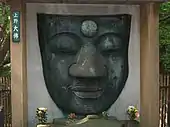 | Former Ueno Daibutsu (上野大仏)[5] | Shaka Nyorai | 1631 | Taitō | Tokyo | Heavily damaged in the 1923 Great Kantō earthquake and melted down for the war effort | |
| Tokyo Daibutsu (東京大仏)[6] | 13 metres (42.7 ft) including base | 1977 | Itabashi | Tokyo | Weighs thirty tons; at Jōren-ji (乗蓮寺); erected in expiation of the Great Kantō earthquake and the war | ||
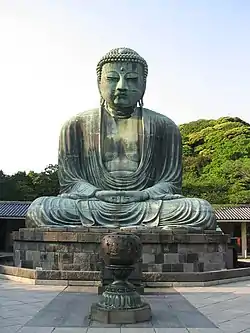 | Kamakura Daibutsu (鎌倉大仏)[7] | Amida Nyorai | 13.35 metres (43.8 ft) | 1252 | Kamakura | Kanagawa Prefecture | Subject of the poem The Buddha at Kamakura by Rudyard Kipling; National Treasure |
 | Takaoka Daibutsu (高岡大仏) | Amida Nyorai | 15.85 metres (52.0 ft) | 1981 | Takaoka | Toyama Prefecture | At Daibutsu-ji (大佛寺) |
| Echizen Daibutsu (越前大仏)[8] | 17 metres (55.8 ft) | Katsuyama | Fukui Prefecture | ||||
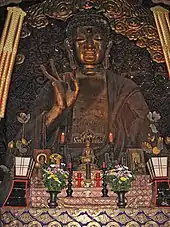 | Gifu Daibutsu (岐阜大仏)[9] | Shaka Nyorai | 13.63 metres (44.7 ft) | 1828 | Gifu | Gifu Prefecture | |
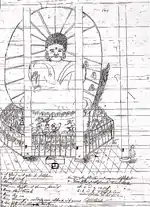 | Former Hōkō-ji Daibutsu (方広寺大仏) | 1660s | Kyoto | Kyoto Prefecture | Sketch of c.1691 by Engelbert Kaempfer | ||
 | Nara Daibutsu (奈良大仏)[10] | Vairocana | 14.98 metres (49.1 ft) | 752 | Nara | Nara Prefecture | Restored several times; part of the UNESCO World Heritage Site: Historic Monuments of Ancient Nara; National Treasure |
 | Asuka Daibutsu (飛鳥大仏)[11][12] | Shaka Nyorai | 2.75 metres (9.0 ft) | 609 | Asuka | Nara Prefecture | Japan's oldest daibutsu and Buddhist statue, restored; Important Cultural Property |
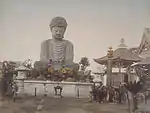 | Former Hyōgo Daibutsu (兵庫大仏)[13] | 1891 | Kobe | Hyōgo Prefecture | At Nōfuku-ji (能福寺); melted down in 1944 for the war effort and since replaced | ||
| (Nehanzo (涅槃仏)[14] | Gautama Buddha | 41 metres (134.5 ft) (length) | 1899 | Sasaguri | Fukuoka Prefecture | At Nanzoin (南蔵院); contains ashes of The Buddha and two of his disciples. |
References
- Bamforth, Chris (26 May 2006), "The capital delights of Nara", The Japan Times
- "Shōwa Daibutsu". Seiryū-ji. Retrieved 23 May 2011.
- "Ushiku Daibutsu". Ushiku Daibutsu. Retrieved 23 May 2011.
- "Nihonji Daibutsu". Nihon-ji. Retrieved 23 May 2011.
- "Ueno Daibutsu". Daily Yomiuri. 30 March 2010. Retrieved 23 May 2011.
- "Tokyo Daibutsu". Itabashi Ward. Archived from the original on 30 August 2012. Retrieved 23 May 2011.
- "Database of National Cultural Properties". Agency for Cultural Affairs. Archived from the original on 23 December 2019. Retrieved 23 May 2011.
- "Katsuyama Profile". Katsuyama City. Archived from the original on 7 October 2007. Retrieved 4 December 2007.
- "Gifu Shouhouji Daibutsu (Great Buddha)". Shōhō-ji. Retrieved 4 December 2007.
- "Database of National Cultural Properties". Agency for Cultural Affairs. Archived from the original on 23 December 2019. Retrieved 23 May 2011.
- "Sandaibutsu". Japanese Architecture and Art Net Users System. Retrieved 23 May 2011.
- "Database of National Cultural Properties". Agency for Cultural Affairs. Archived from the original on 23 December 2019. Retrieved 23 May 2011.
- "Daibutsu Hyogo". Nagasaki University Library. Retrieved 23 May 2011.
- "Karmic Cleansing". Macleans.ca. Retrieved 9 December 2015.
External links
| Wikimedia Commons has media related to Statues of the Buddha in Japan. |
This article is issued from Wikipedia. The text is licensed under Creative Commons - Attribution - Sharealike. Additional terms may apply for the media files.